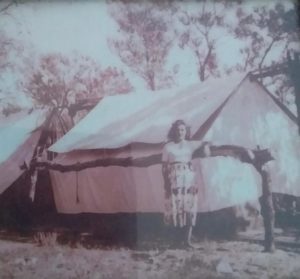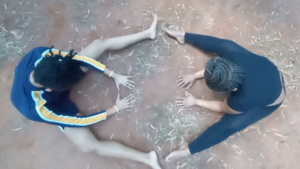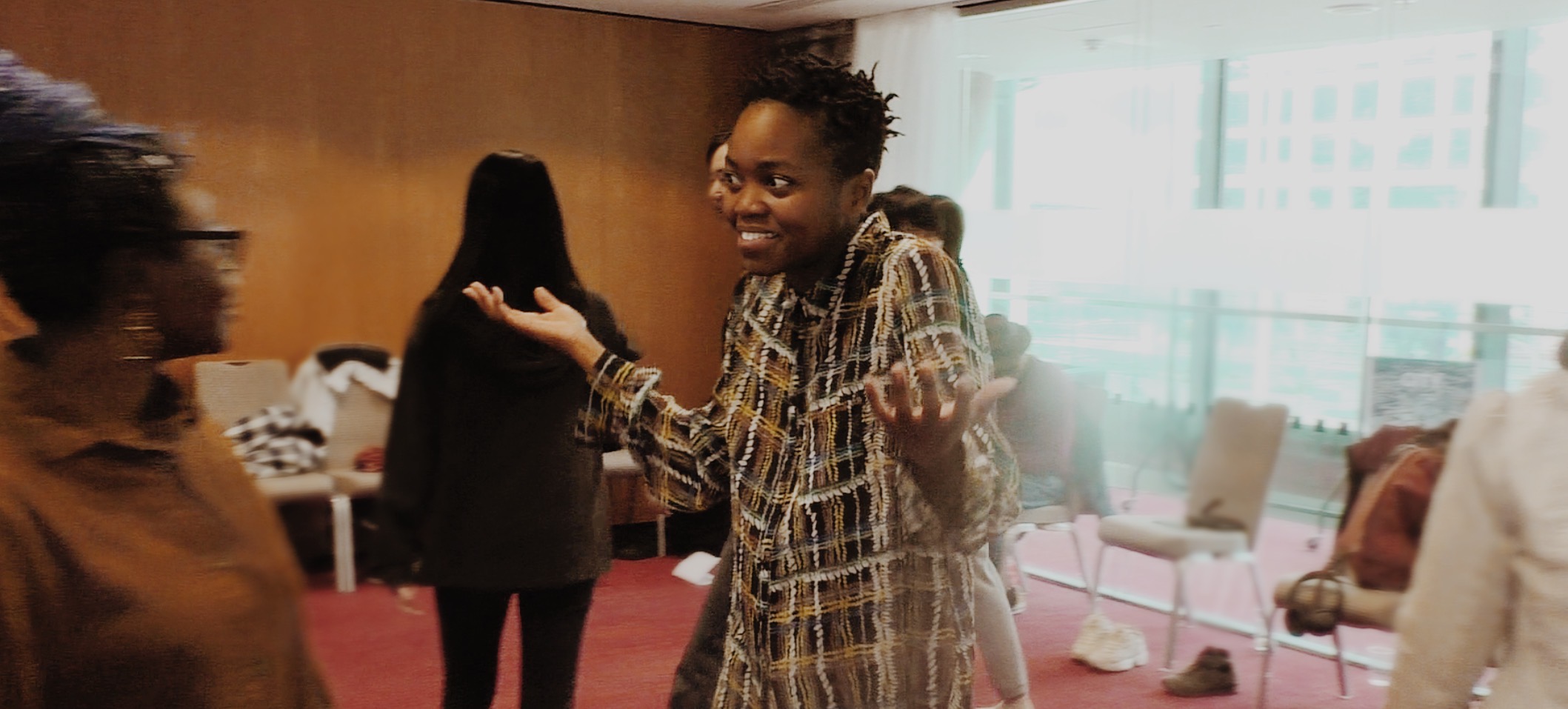
Performing the languages we live
This blog post is a copy of its original publication on the Creative Multilingualism blog here
‘We breathe English, but we don’t live it’ says Dion Nkomo, educator at the University of Cape Town.* Nkomo’s claim echoes the powerful voices before him of South African resistance against colonialism, apartheid and post-apartheid, many framing their discussions with the question: which language/s should be used and why? Media censorship during apartheid saw theatre and performance-makers coming together to perform stories of injustice. Continuing to the contemporary moment, these performance-making processes rehearse values that are felt missing from the leadership of state institutions: egalitarianism, close collaboration and renegotiation of the local languages most relevant to their characters and context.
I drew from these complex sites of negotiation for my PhD research at the University of Warwick. As a performance-maker, I hoped for this research to propose methods for facilitating multilingual performance-making within the UK and other constitutionally monolingual nation states, including my native Australia.
My PhD research Mobilising languaging: facilitating dynamic linguistic resources in applied performance praxis (2019) examined the role of the collaborating actor’s body in improvisational exercises to disrupt dominant languages. While language is understood as a discrete and static competency, languaging is a shared process of interaction seeing us draw from our varied linguistic and embodied resources. By mobilising languaging, actors drew more widely and fluidly from their resources for the intelligibility of their collaborators. The suggestion made through this process is that as performance works emerge, actors perform the languages they/we live, rather than are forced to breathe.
Creative Multilingualism and Slanguages, led by Professor Rajinder Dudrah, recently supported my first opportunity for sharing and furthering this research in practice. The workshop The body, making and (s)languaging at the Birmingham Rep on Friday 13th March, brought together Slanguages and non-slanguages performers and practitioners to explore my research further.
Watch this short film to gain a deeper sense of the day:
The day began by sharing a sit-down lunch in the Rep’s restaurant; coming together in a studio for Prof. Dudrah’s introduction covering the ambitious Slanguages initiatives over the last four years; followed by my discussion of the background, motivations and contributions of this research; an improvisational session with director and researcher Micia de Wet reflecting these contributions; and, a break-out session inviting artists to share provocations from their artistic practices.
Criticality and generosity were each in overwhelming supply throughout the day. Artists from China, Denmark, Japan, Luxembourg, Nigeria, Wales, South Africa (SA), and the diasporas of the UK were present, generously sharing their experiences of artistic practice. Our diversity saw us debating the place of English in our work across wide-ranging contexts, grappling with how we are simultaneously disadvantaged by its hierarchies while benefiting from its prestige.
Since central to my PhD contributions were the improvisational exercises in the performance-making processes of de Wet’s Johannesburg-based production Father, My Father (2017), it was only fitting that de Wet, who now lives locally, guided participants through a series of accumulative instructions including gesture, rhythm and vocal phrases. Mirroring the improvisational exercises in Father, My Father, we began to see artists mobilise languaging: as their bodies accumulated and transformed each other’s embodied and linguistic resources, they increasingly intensified their interests in each other’s intelligibility over those in the peripheries, disinhibiting them from using non-English resources they otherwise wouldn’t. It was during these interactions that I not only saw my research reflected but challenged and furthered in new contexts.
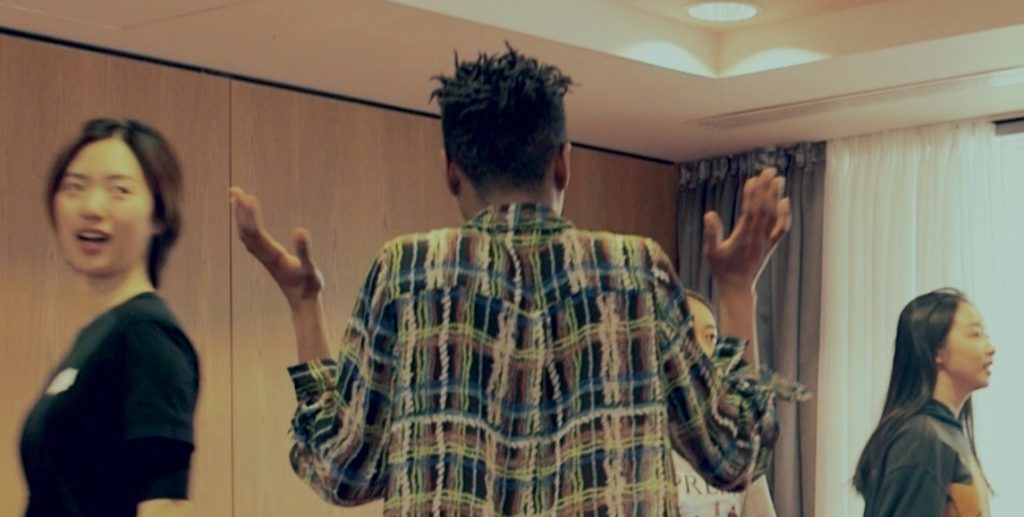
Key learnings from this session involved realising the value in moving from evaluating artists’ participation as resistant to reflexively disentangling the expectations built into our approaches to facilitation and observation. When de Wet requested artists to produce vocal phrases in any language while listening to their peers, we observed an artist interacting with their peers by asking in English what language/s they are speaking at that given moment, as well as making comment on their personal linguistic competencies. These responses were not expected by de Wet and I due to how the artist was neither breaking from everyday approaches to interaction, nor releasing themselves into the close collaboration emphasising spontaneity, play and the body. However, observing them as resistant doesn’t offer the same analytical possibilities then if it were in SA contexts, where resistance has been central to personal consciousness and public debate. This is a reminder of the importance of context for framing our observations and analysis.
More usefully perhaps is to reflect on our approaches to facilitation and observation and how they prescribed a vernacular for participation. Both de Wet and I have trained in acting training techniques which, despite their hybridity, are largely rooted in Euro-American paradigms. Just like any other vernaculars, these vernaculars of acting training are learnt and practiced. In simply not responding through these vernaculars, the artist wasn’t necessarily being resistant, rather, they mightn’t have been versed in these specific collaborative approaches. Considering that this was a workshop aimed at challenging dominant languages, we must be equally critical in challenging our own beliefs that shape our ways of seeing, hearing and knowing. Thus, in avoiding labelling this artist as resistant, de Wet and I take first steps to refining these improvisational exercises for UK contexts, porous to artists’ and performers’ new contributions to languaging.
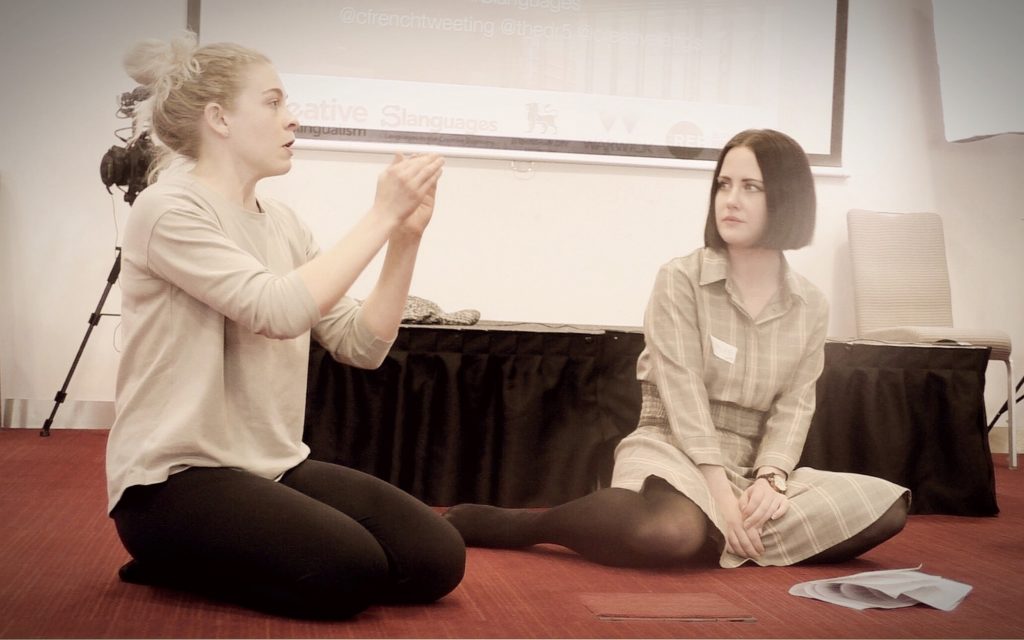
Cohering these observations into a possible future Slanguages collaboration, I suggest that there is an extended period of time spent for developing shared vernaculars between artists. This might begin with opportunities for translations of concepts and ideas by artists, so that the languages we use (particularly my/our academic languages) are critically located and questioned on their relevance to the context at hand. The place of improvisational exercises as a catalyst for languaging might be then used as starting points for artists to deconstruct and/or add to, based on their interests. Bringing together these ideas into artist training, as part of an ongoing programme, might then allow for shared vernaculars to be collaboratively strengthened for context-relevant methodologies that perform the languages we live.
A shared toolkit of (s)languaging methodologies is proposed as part of a future vision of Slanguages practice: one that develops collaboratively over time, emphasises reflexivity in how it adapts to local/national artistic practices, and is documented digitally to scale opportunities for access. Who’s in?
This event was supported by Creative Multilingualism, Birmingham City University and the Institute of Advanced Studies, University of Warwick.
This blog post is a copy of its original publication on the Creative Multilingualism blog here
* Nkomo, Dion. “Overcoming Barriers to University Education in South Africa.” YouTube, University of Birmingham, Oct 20, 2017, https://www.youtube.com/watch?v=5qzLD1s6Bes&t=136s.
Feature photo: Lanaire Aderemi & Mel Varin in The body, making & (s)languaging

